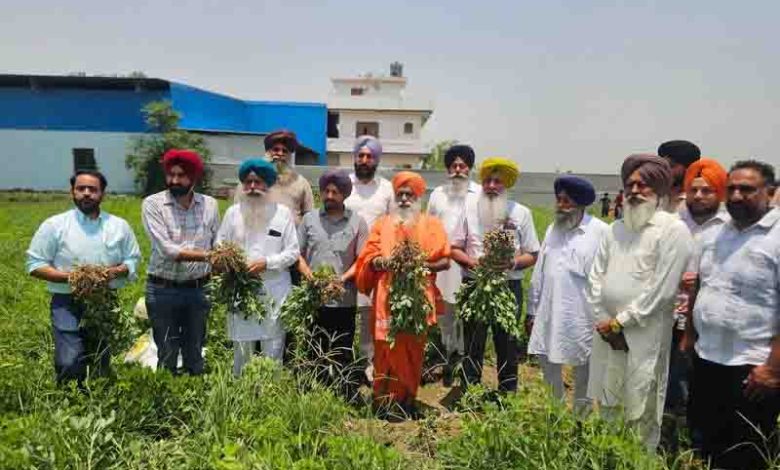Phagwara: Farmers asked to grow eco-friendly groundnuts

Jalandhar: KVK Kapurthala of Punjab Agricultural University, under the Directorate of Extension Education, PAU, Ludhiana, organized a field day on spring groundnut variety J-87 at Mothawal village. The event aimed to promote sustainable and profitable crop diversification among farmers, highlighting groundnut as a promising alternative crop for the changing agricultural landscape of Punjab. Rajya Sabha MP and environmentalist Balbir Singh Seechewal spoke on the critical importance of conserving irrigation water in Punjab’s agriculture system. He lauded groundnut for its low irrigation and minimal fertilizer requirements, stressing how this eco-friendly crop can help mitigate environmental issues and promote sustainable agriculture in the region. Tarsem Singh Dhillon, Additional Director, Extension Education, PAU, termed the initiative as a pioneering step towards reviving spring groundnut cultivation in Punjab. He emphasized the need to develop a comprehensive agribusiness model that integrates advanced production technologies, mechanization, efficient marketing strategies and processing infrastructure to support farmers and ensure commercial viability of the crop.
Dr Harinder Singh, Associate Director (Training), KVK Kapurthala, shared information about the rich history of groundnut cultivation in Kapurthala, which extended over 12,000 hectares in the 1980s. He discussed how the current dominance of water-intensive crops like paddy, potato and spring maize, which cover over 16,000 hectares with over 300 per cent cropping intensity, has led to alarming groundwater depletion. He advocated spring groundnut as a water-efficient leguminous crop suitable for integration after potato crop. This crop improves soil structure and fertility, reduces urea requirement in subsequent crops and helps suppress soil-borne and leaf diseases in melons and other horticultural crops. In the technical session, Dr Mandeep Singh elaborated the package of recommended practices for spring groundnut cultivation, highlighting the characteristics of J-87 variety. The variety matures in 100-115 days, yields up to 15.3 quintals per acre and requires only 4-6 irrigations, making it highly water-efficient. Farmers can expect a net profit between Rs 70,000 and Rs 75,000 per acre, he said. Field demonstrations were organised in several villages, including Mothanwala, Jorjpur, Barindpur, Lohian Khas, Sial, Bhagwanpur and Bhagatpur, giving farmers a chance to see the crop performance first-hand and interact with experts to resolve field issues.
Dr Gagandeep Dhawan, Assistant Professor, Soil Science, elaborated on the important role of groundnut in enhancing soil health and sustainable agriculture. He informed that groundnut fixes 25-60 kg nitrogen per hectare through symbiotic relationships with rhizobium bacteria, thereby reducing dependence on synthetic fertilisers and saving 55-130 kg urea per hectare. Nitrogen fixation improves soil organic matter, enhances soil structure and promotes microbial activity, thereby maintaining soil fertility and resilience in the long term. He encouraged farmers to include groundnut in their crop rotation to improve soil productivity and reduce chemical inputs. Dr. Suman Kumari, Assistant Professor (Plant Protection) discussed the major pests affecting spring groundnut such as aphids, leaf miners, thrips and white grubs. She provided valuable guidance on integrated pest management practices emphasizing the importance of regular monitoring, seed treatment and judicious use of biopesticides and recommended insecticides. These measures are important to effectively protect the crop while maintaining ecological balance. The programme concluded with a heartfelt vote of thanks delivered by farmer Jarnail Singh of Kamalpur, who expressed his heartfelt gratitude to PAU-KVK Kapurthala, distinguished guests and experts for their constant support and efforts in promoting spring groundnut cultivation. He encouraged fellow farmers to adopt this sustainable and profitable crop to increase their income while conserving natural resources.





